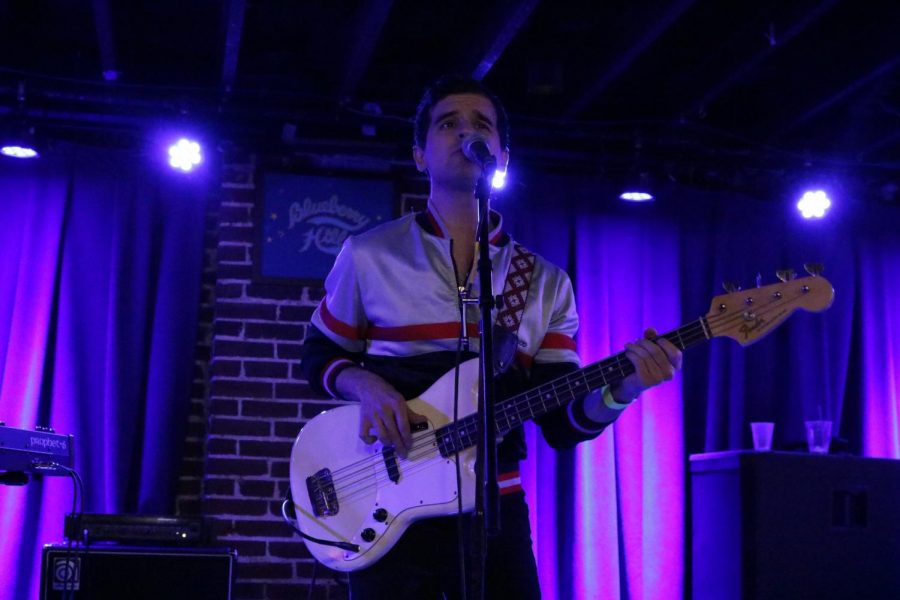Starwolf Shines at Blueberry Hill
Laden with undertones from songs of the 1980s, Starwolf’s music successfully works indie with synth pop. The St. Louis band released its debut EP “Ti Amo, Stargazer” on Nov. 9, which features six songs – its cover song “Ti Amo, Stargazer,” “Take It All,” “Guilty Pleasure,” “Heartbreak Woman,” “Tu Es Belle” and “The Meaning of Life.”
The band premiered its newly released album at Blueberry Hill’s Duck Room on Nov. 23 at 8 p.m. and was opened by fellow St. Louis bands The Free Years and Old Souls Revival.
Starwolf members Tim Moore, Max Sauer and Chris Rhein performed at Loufest in 2017, and since then, have worked to amplify their retro synth vibe by incorporating saxophone, falsetto vocals and traces of groove-inspired piano and bass runs.
As someone who solely listens to songs from the early 2000s and prior, my primary genre of music consists of alternative and rock from Green Day, Foo Fighters and Elton John. Needless to say, Starwolf has not been on my radar as much as other St. Louis residents.
Though my taste has not aligned with much of the current music, I would make room for Starwolf on my Spotify playlist. The band name might give it away, but Starwolf’s tone reminds me of something along the lines of Star Wars – but with influences from Phil Collins. Yes, quite an unconventional combination, but its opening song “Mysterious Love” had all three musicians busting out with electronic music. As the band progressed to the chorus, Rhein’s singing became smooth and Moore’s drumming turned into what some call the “gated reverb,” a staple of popular Phil Collins’ songs, such as “In the Air Tonight.”
Other notable songs included “Heartbreak Woman,” which similarly starts with a synth piano solo and crescendos to a steady drum beat integrated with some spurts of techno runs.
I particularly enjoyed “Guilty Pleasure” because it deviated from some of the synth tones that the band is well known for. The song started with a short piano solo and led into a drum beat and Rhein singing, with the occasional three higher-note runs on the piano, which worked in tandem with Rhein’s voice in falsetto. Though “Guilty Pleasure” did not employ as many electronic tones, the ending resembled that of a machine shutting down.
Given the two opening bands, I was not expecting Starwolf to exhibit a chill wave beat with interspersed climbs. The Free Years was a huge disappointment. Maybe this was because the Duck Room was a little bare as people were starting to file in and grab drinks; maybe this was because lead singer Matthew James missed some higher notes.
Periodically, James would try to engage the audience by making jokes that only resulted in crickets. He also told the crowd to move closer to the stage. One audience member moved up and was dancing alone. It was a rather comical sight.
After The Free Years performed, Old Souls Revival walked onto stage. My thought: ‘I hope this band, and Starwolf, are better than the first.’
Thankfully, Old Souls Revival exceeded my expectations. As a frequent listener of “Weird Al” Yankovic, Old Souls Revival’s lyrical parody style reminded me of the former artist. Compared to Starwolf’s jazz and techno combo, Old Souls Revival was more within the rock genre. Lead singer Neil Luke had some growl at the end of his voice. His engagement with the other band members and lack of awkwardness, compared to James, got the audience dancing and ready for Starwolf to perform.
The venue itself was great for a relaxed concert atmosphere – I could grab a drink, dance and mingle with others. I enjoyed two out of the three bands, and believe I am a testament that someone can enjoy listening to a music genre he or she is not familiar with.
Your donation will support the student journalists of Saint Louis University.

Staunch entered SLU as a Biomedical Engineering major on a Pre-med track, with the intention of continuing her studies in medical school. After a year and a half at SLU, she realized she missed the balance of the arts with sciences as she was previously an editor in her high school yearbook committee.
"Working for UNews, whether it was as Associate News Editor, Managing Editor, or Editor-in-Chief, has taught me the value of working on tight deadlines and how to adequately adapt to certain unexpected situations. The field of Journalism is incredibly fast paced - but that is why I love it so much," Staunch said. "There is always something new occurring, and you would not be able to effectively complete your job unless you had the support of your other editors and staff."
Though paradoxical in nature, she switched her major to Communication. She wants to incorporate both her analytical and creative sides to report on medical topics. Her dream job: to write for Discover Magazine.
When Staunch is not in the newsroom, she is captaining the women’s Ultimate Frisbee team at SLU. She began playing her freshman year and enjoys it as an outlet.




